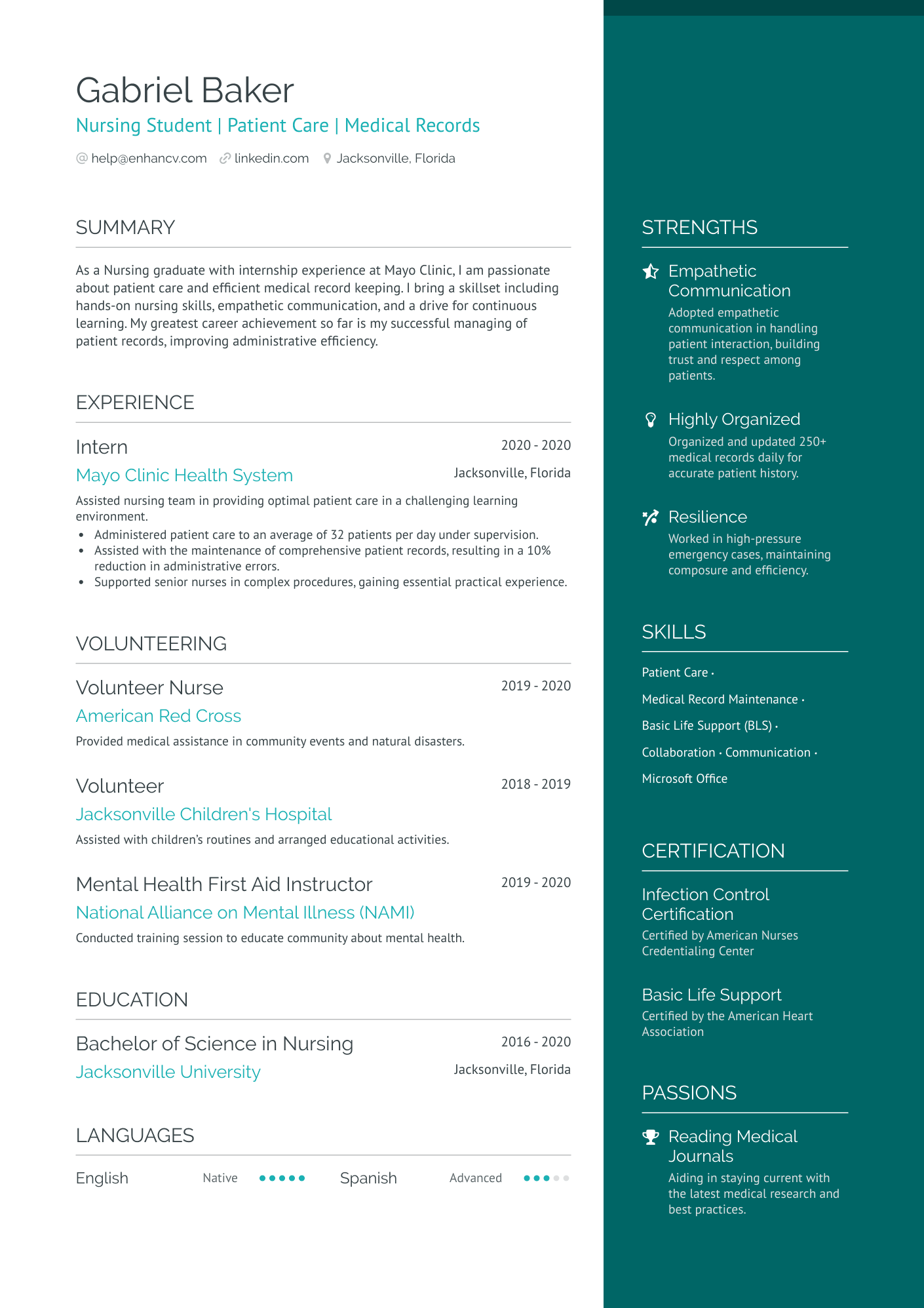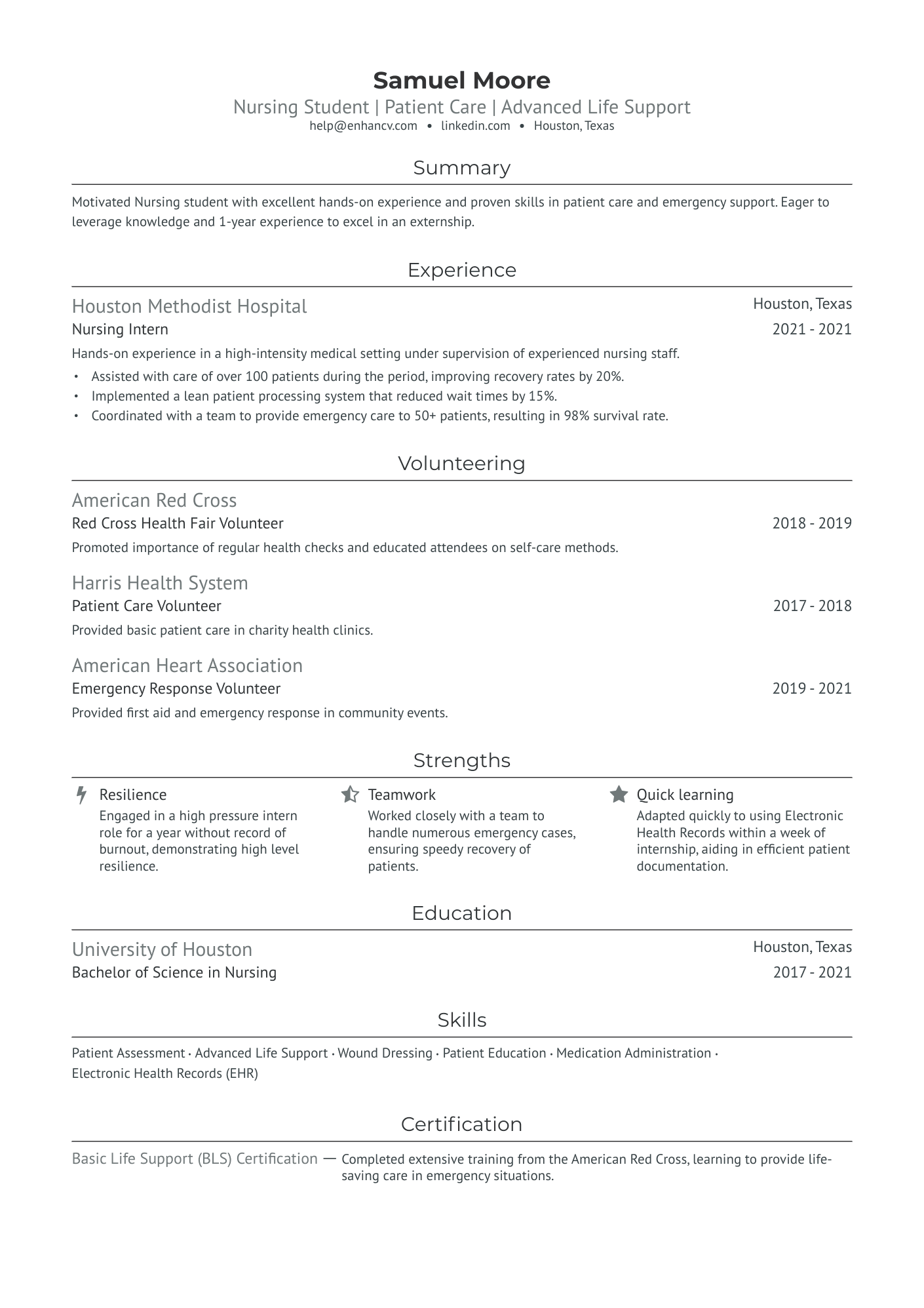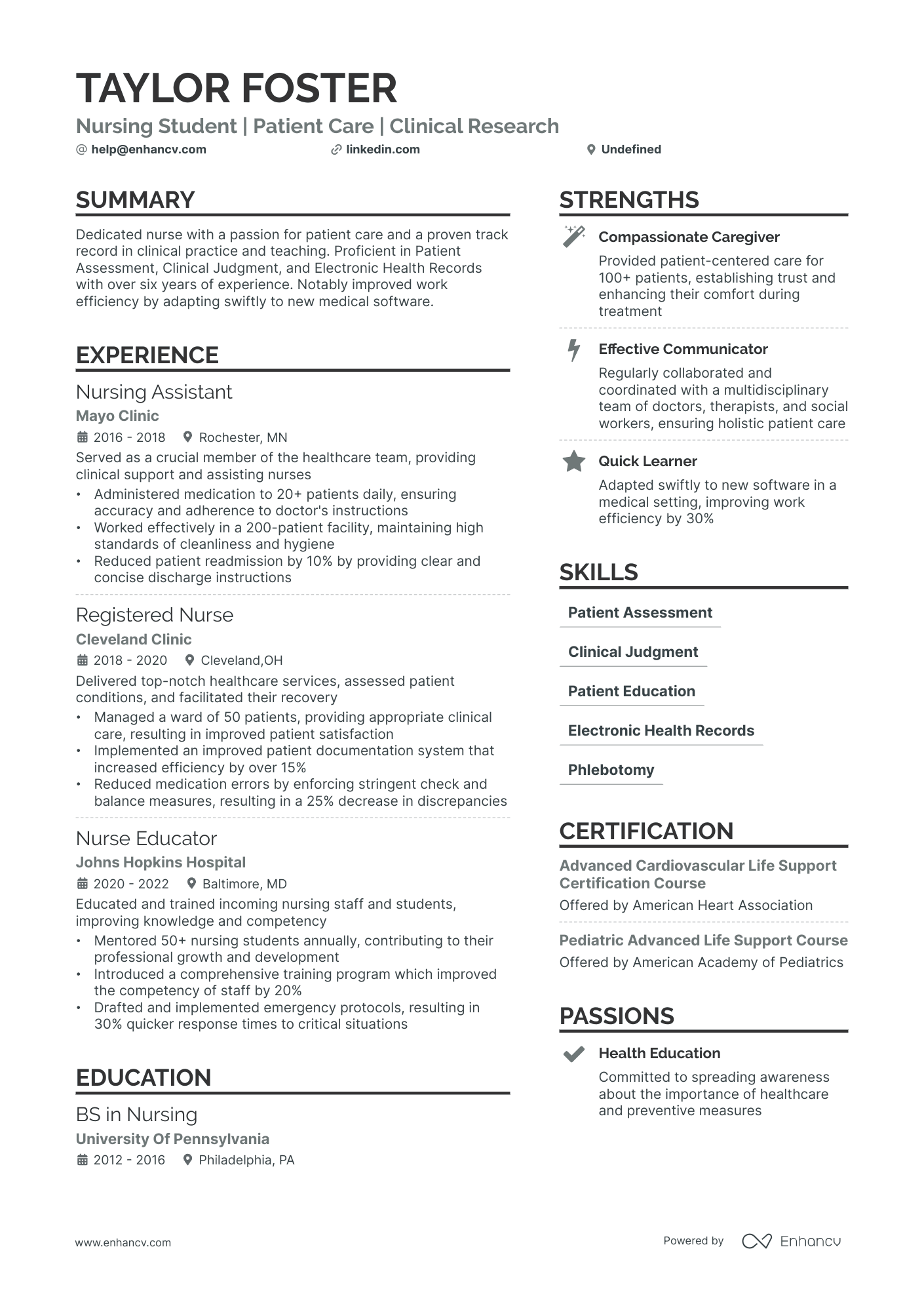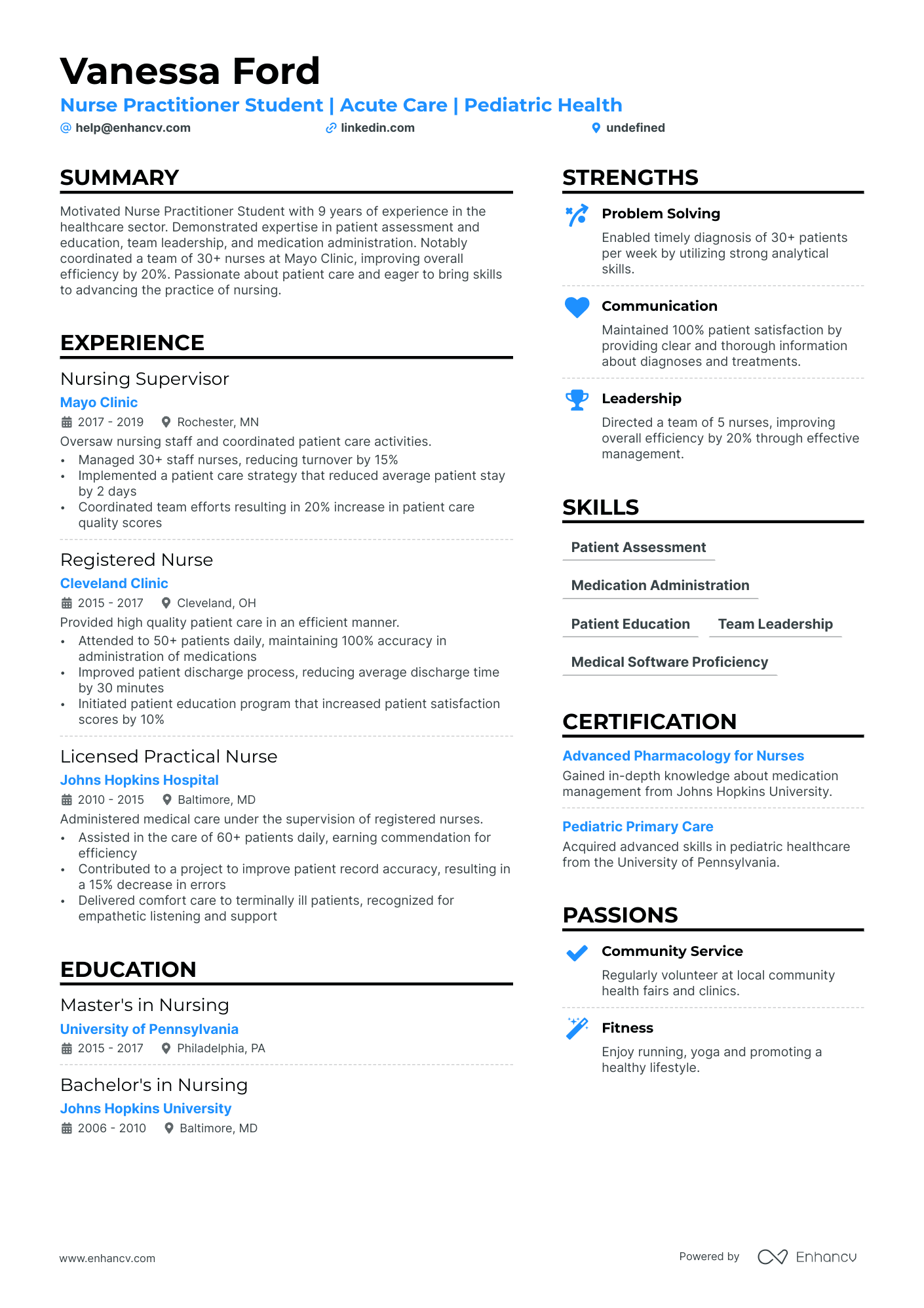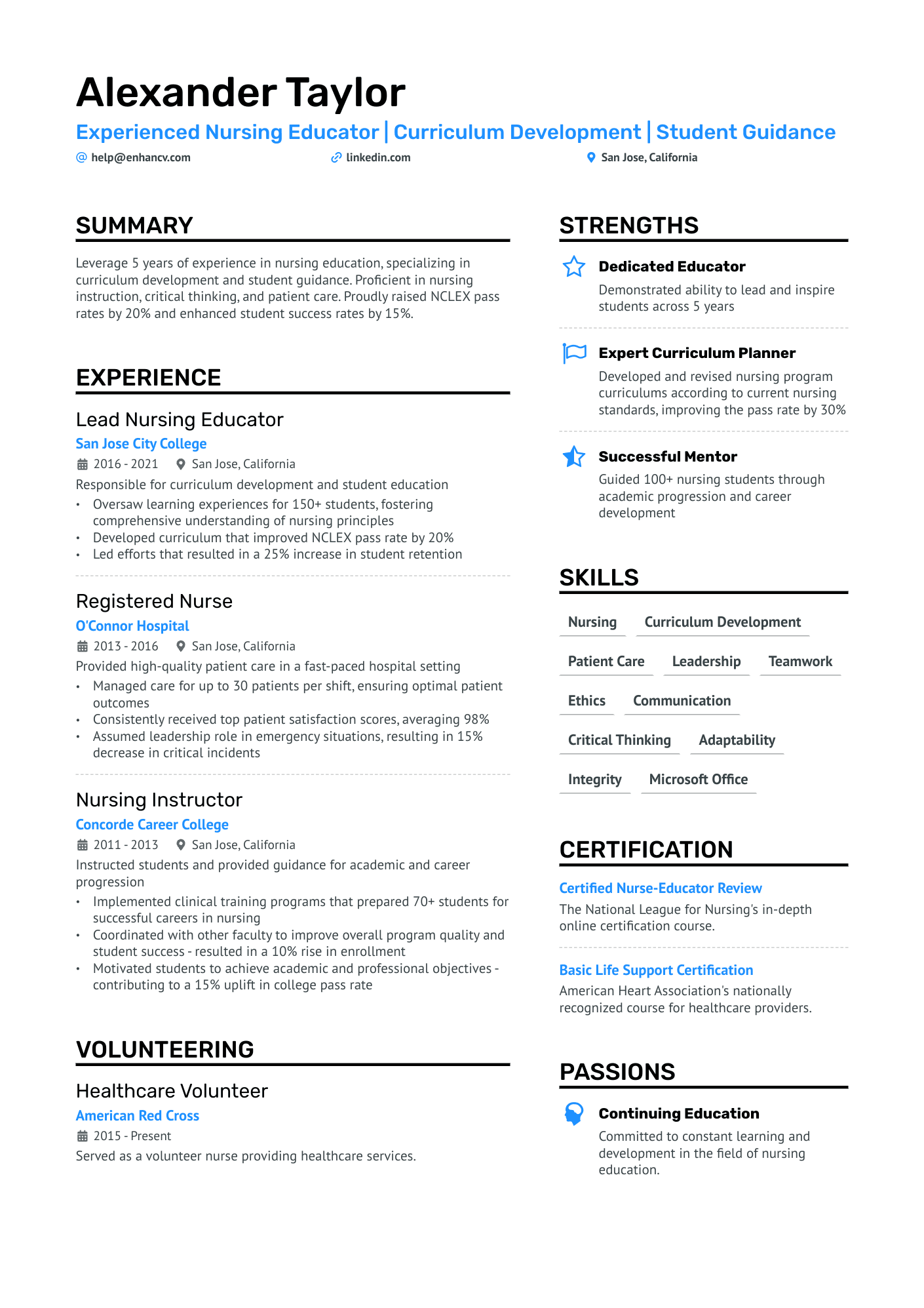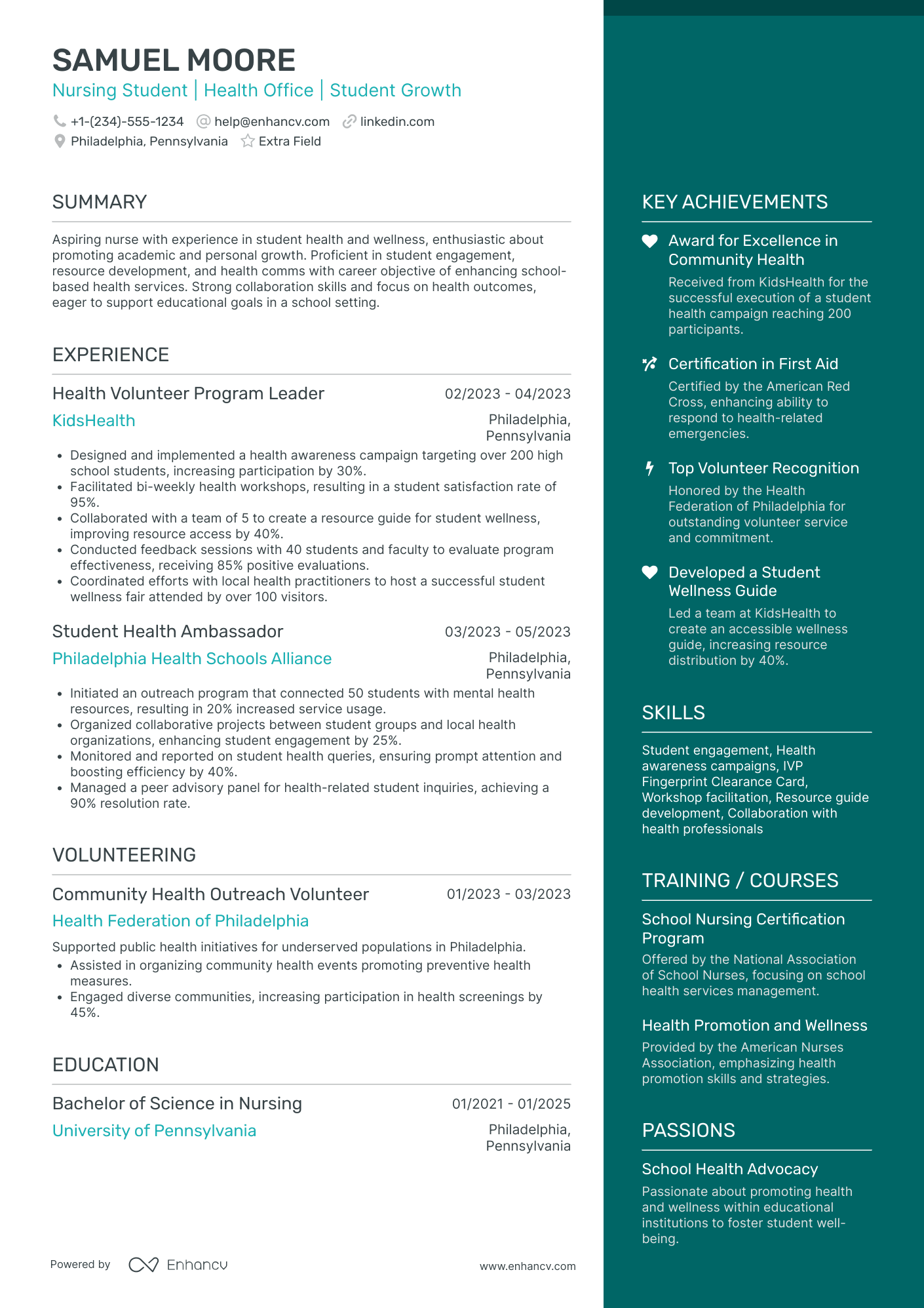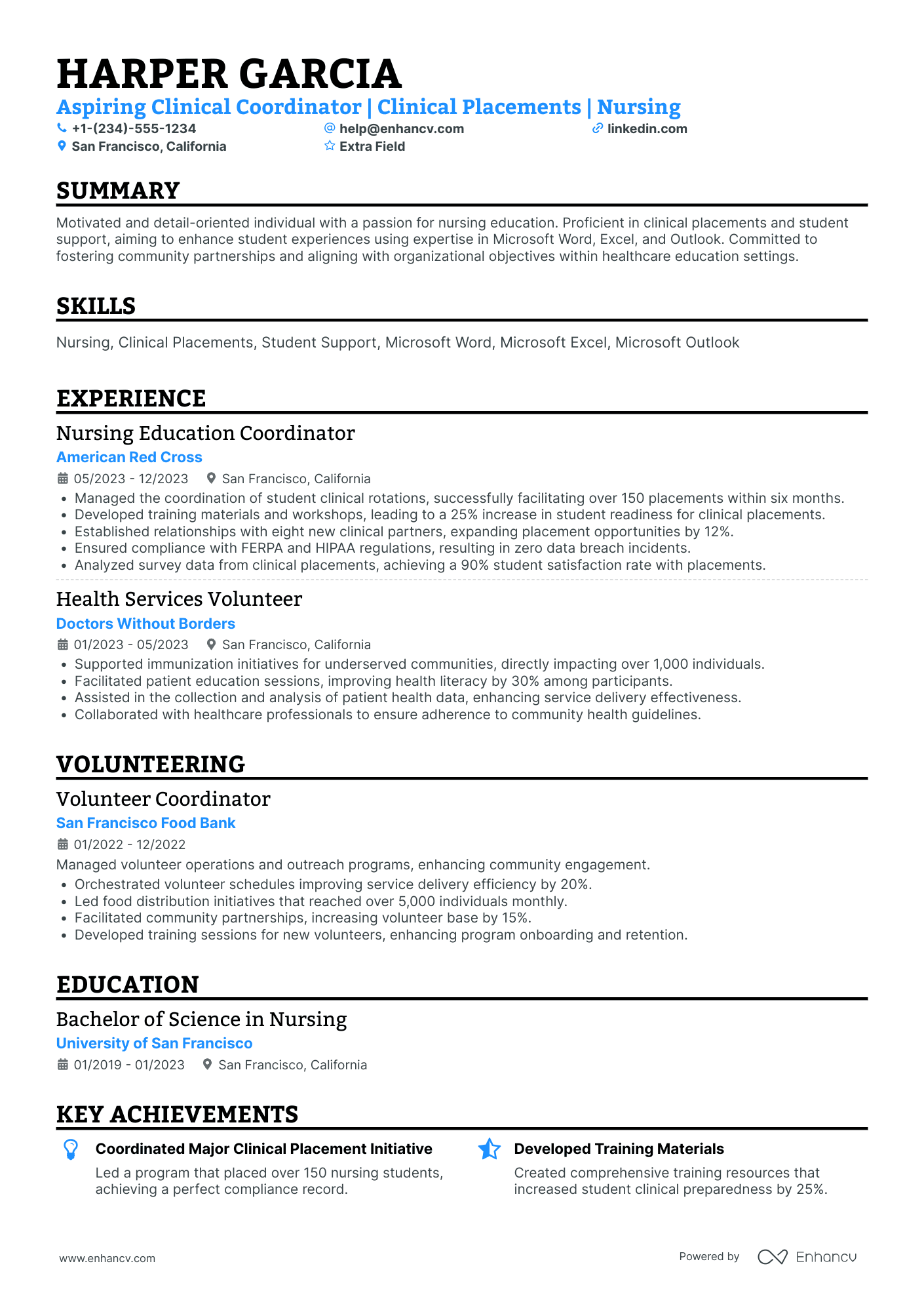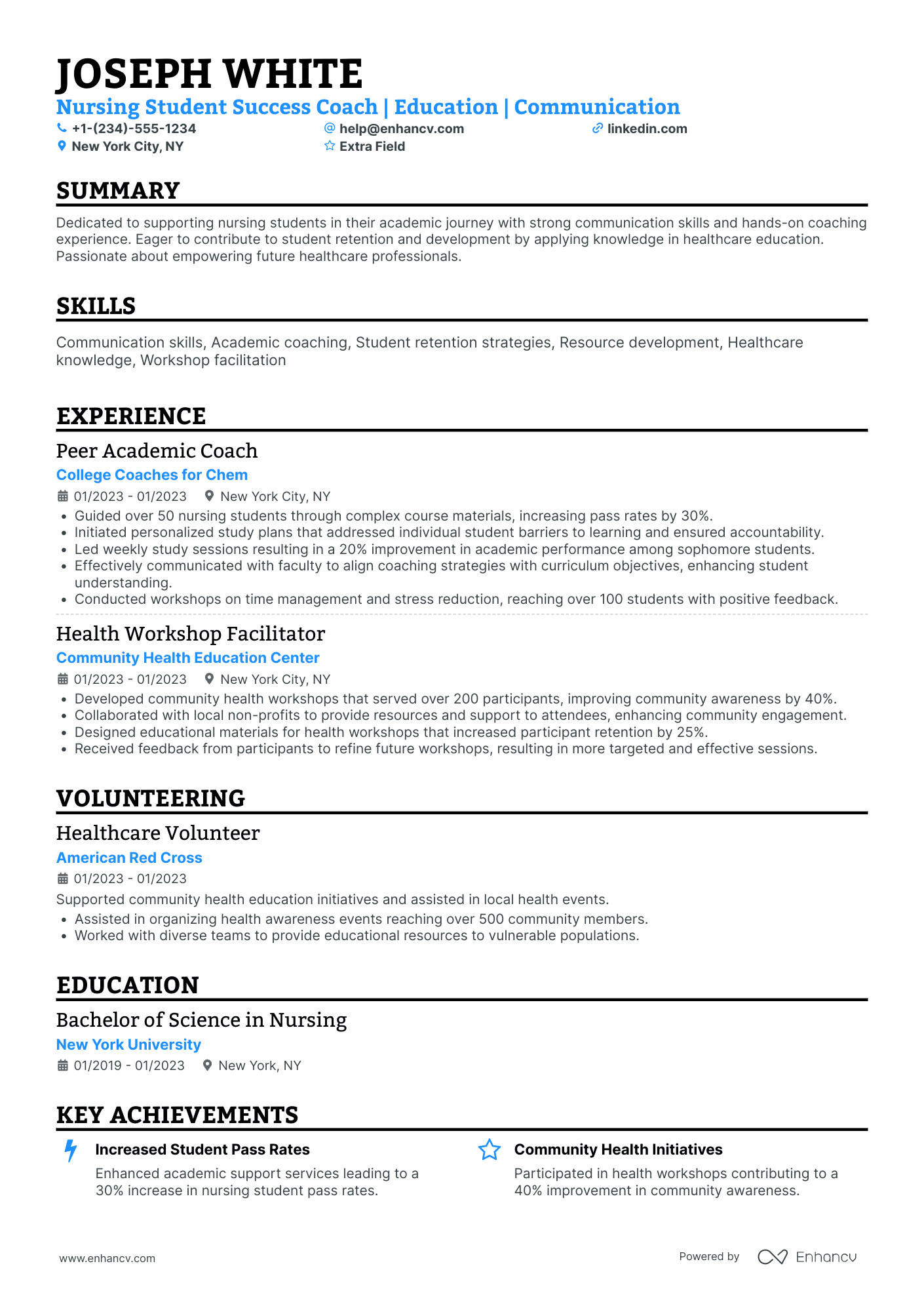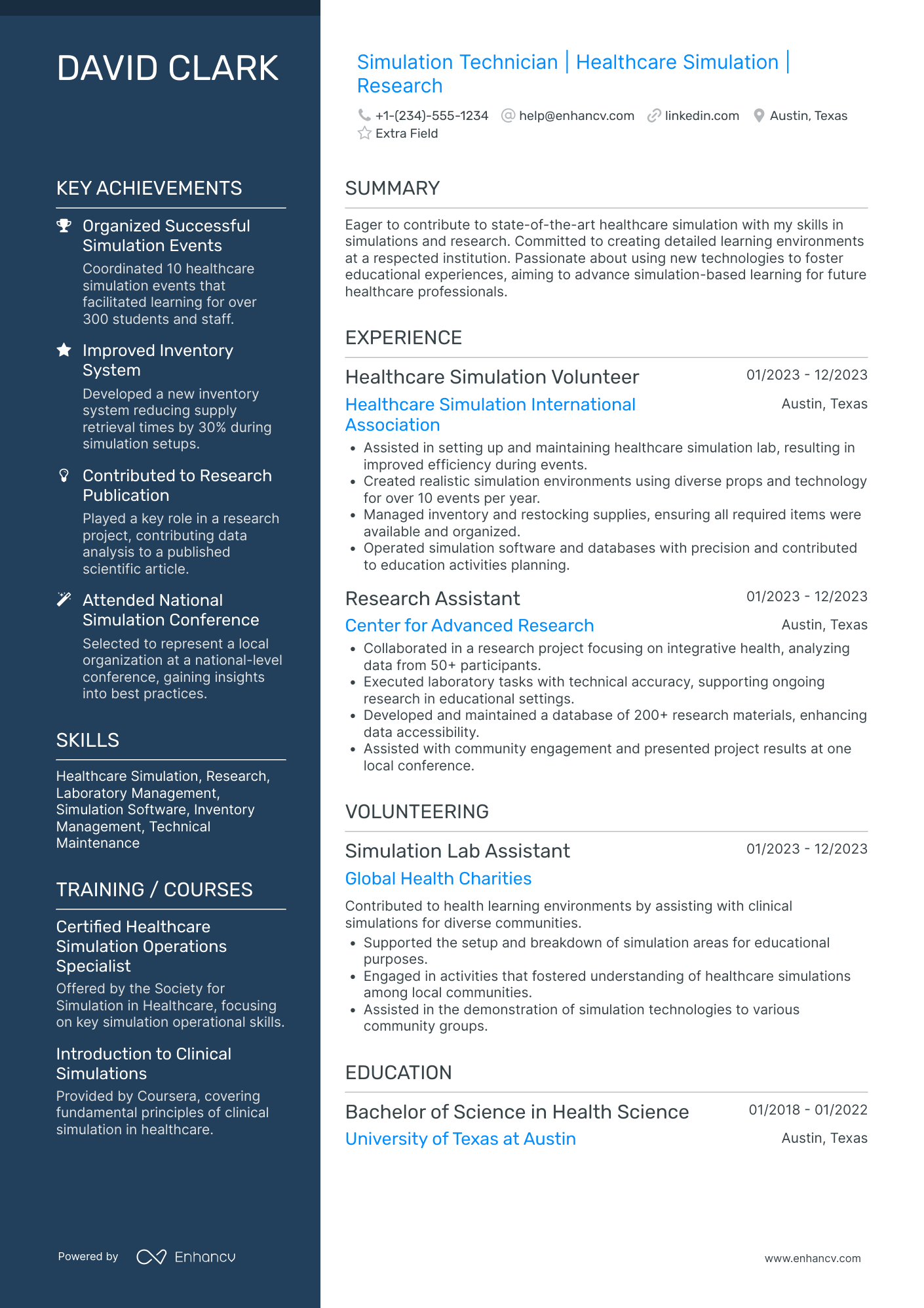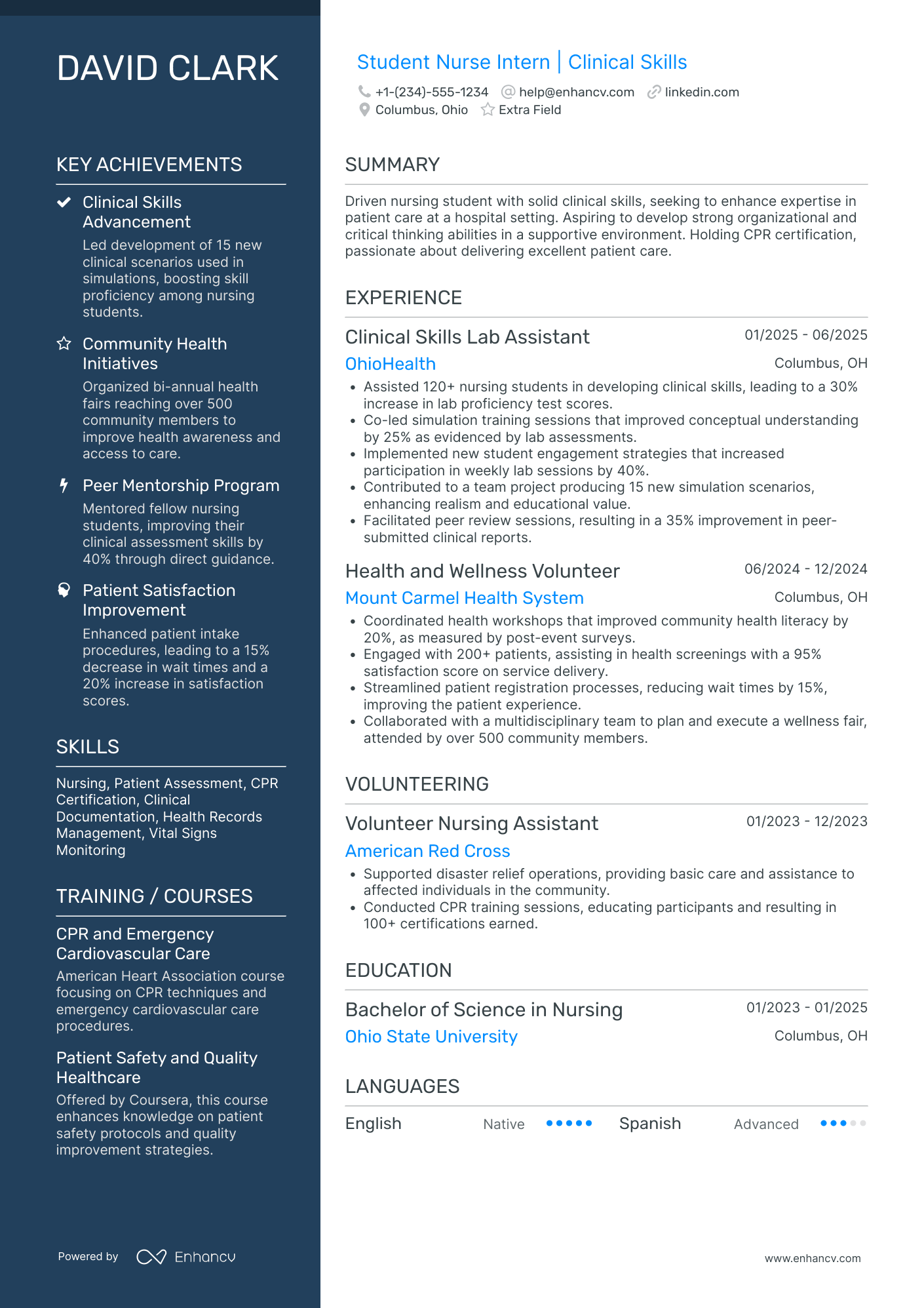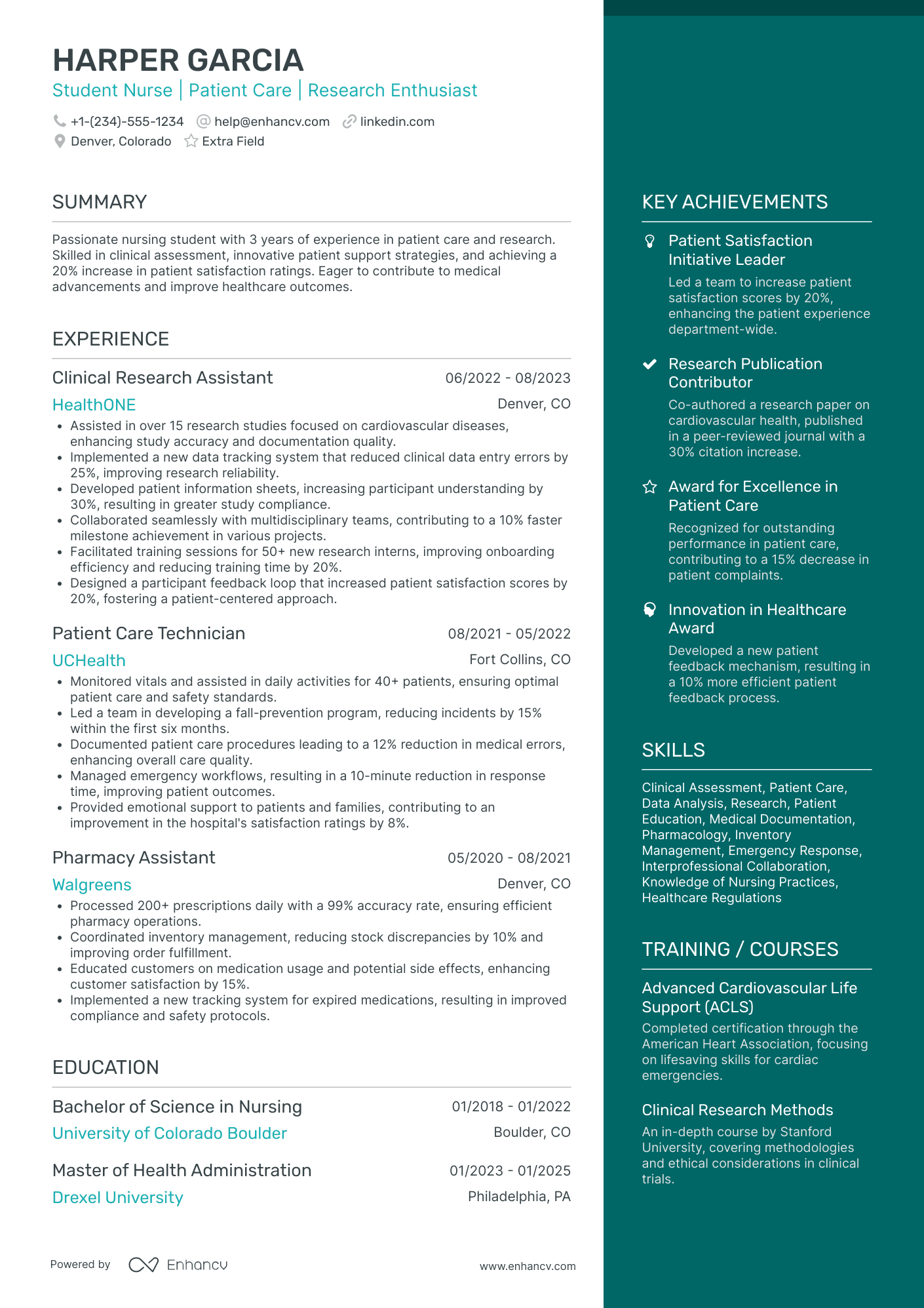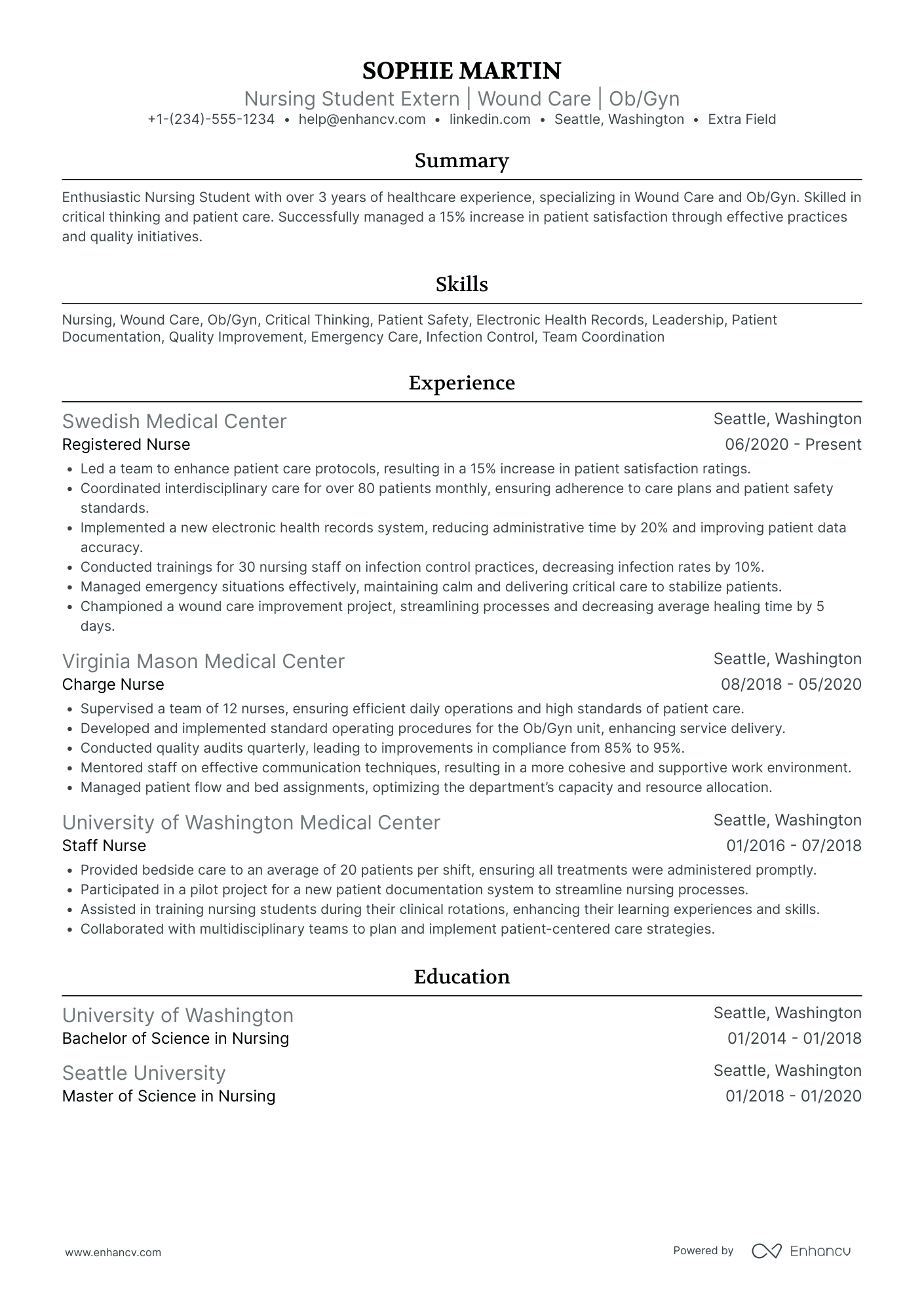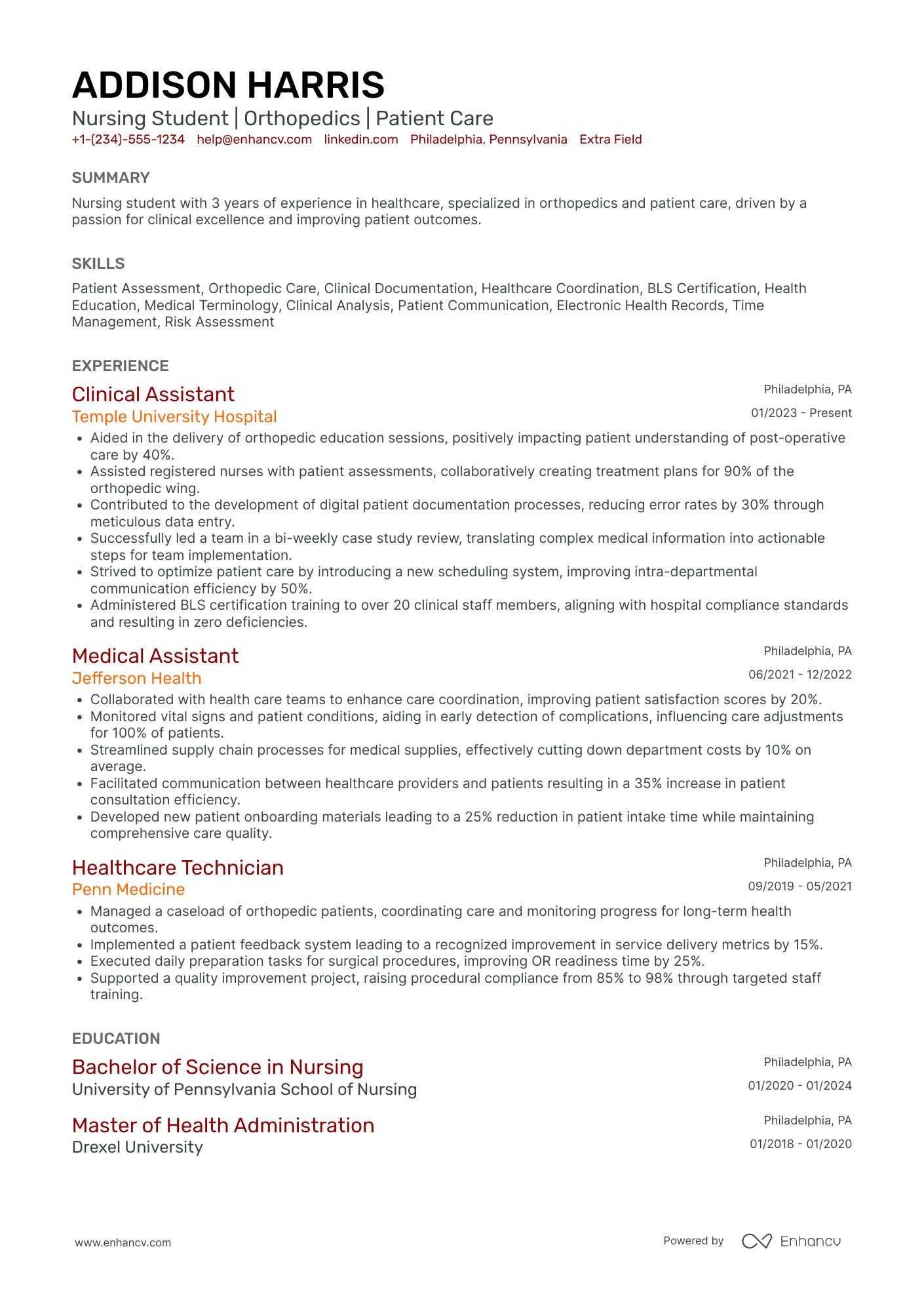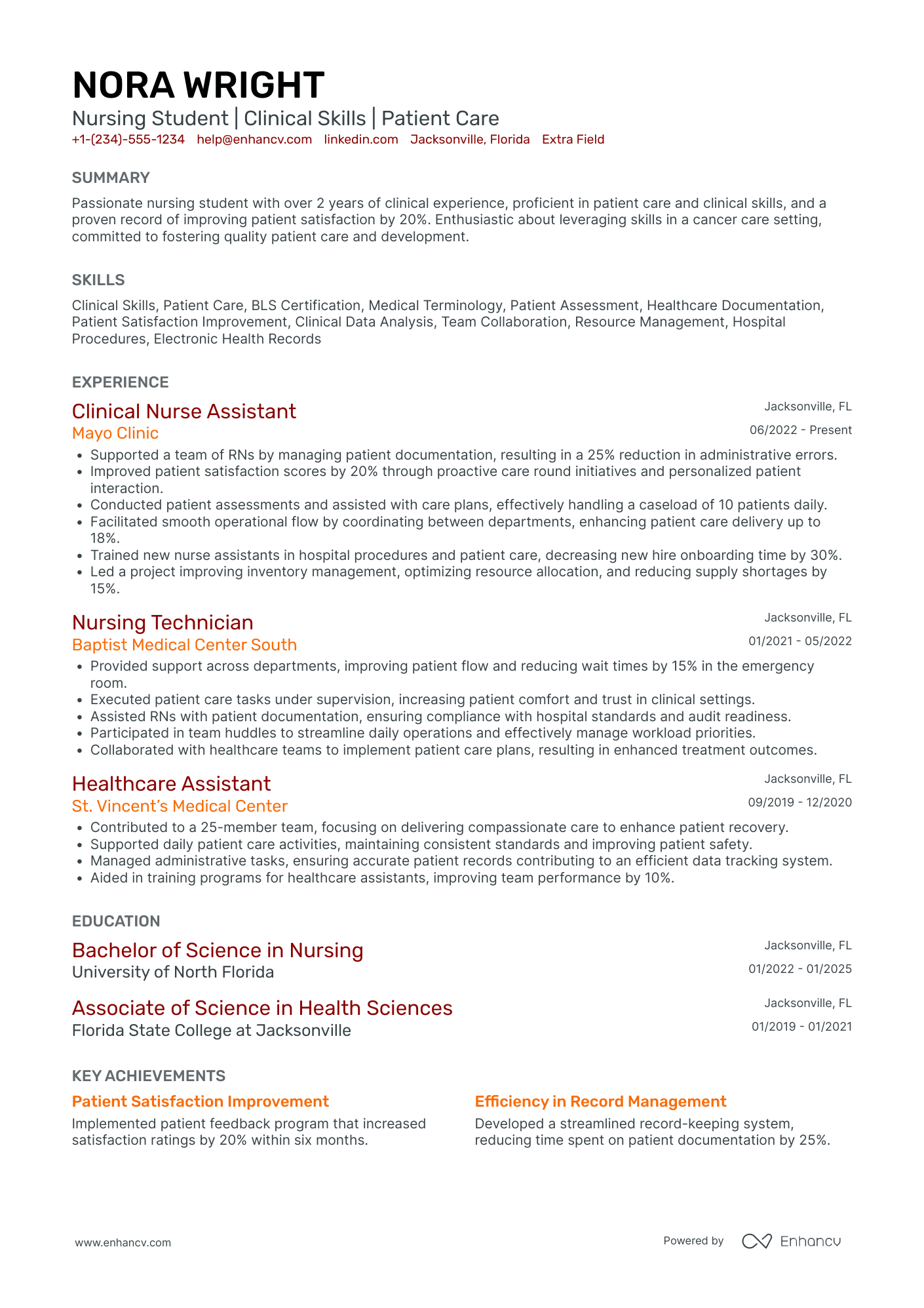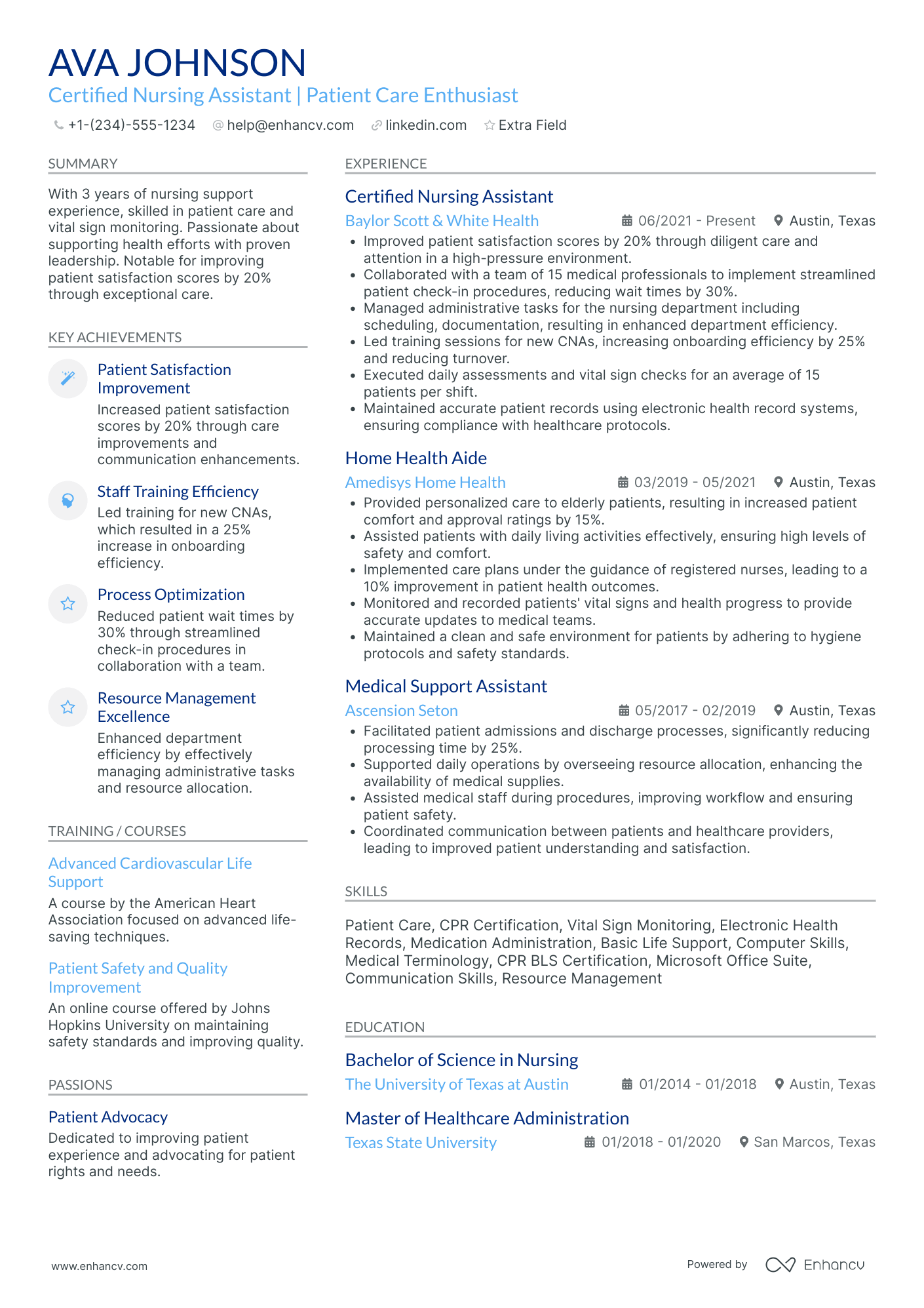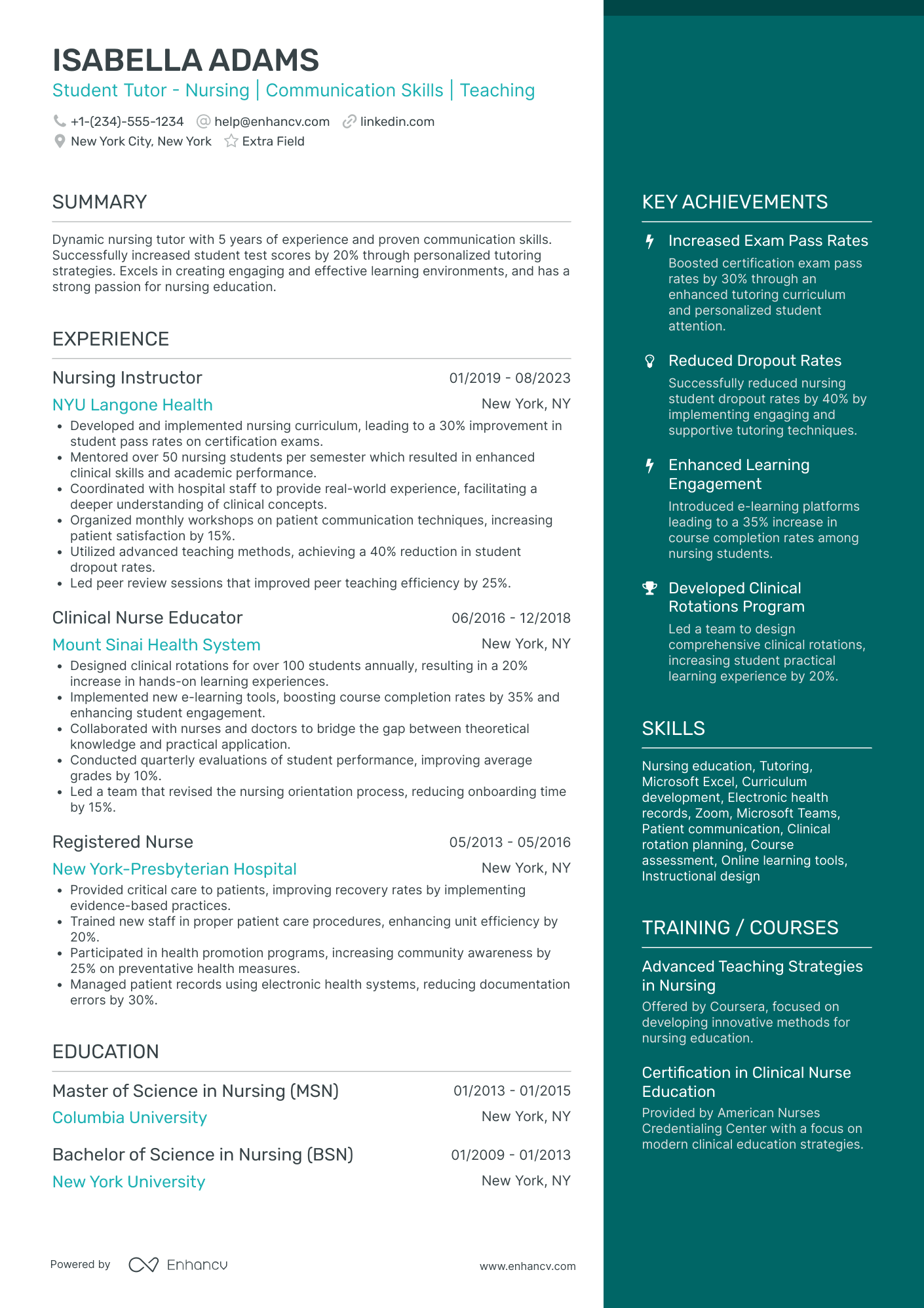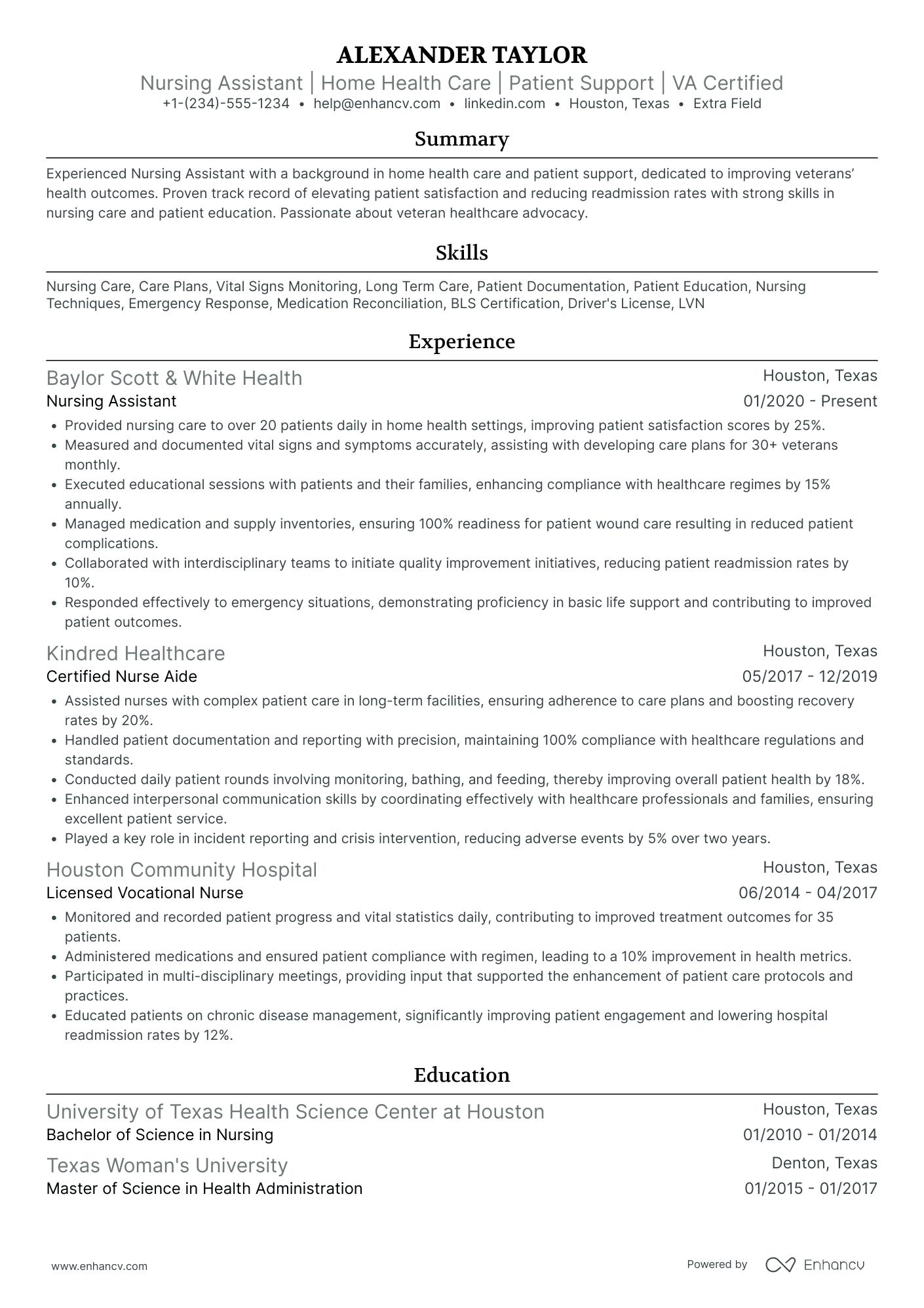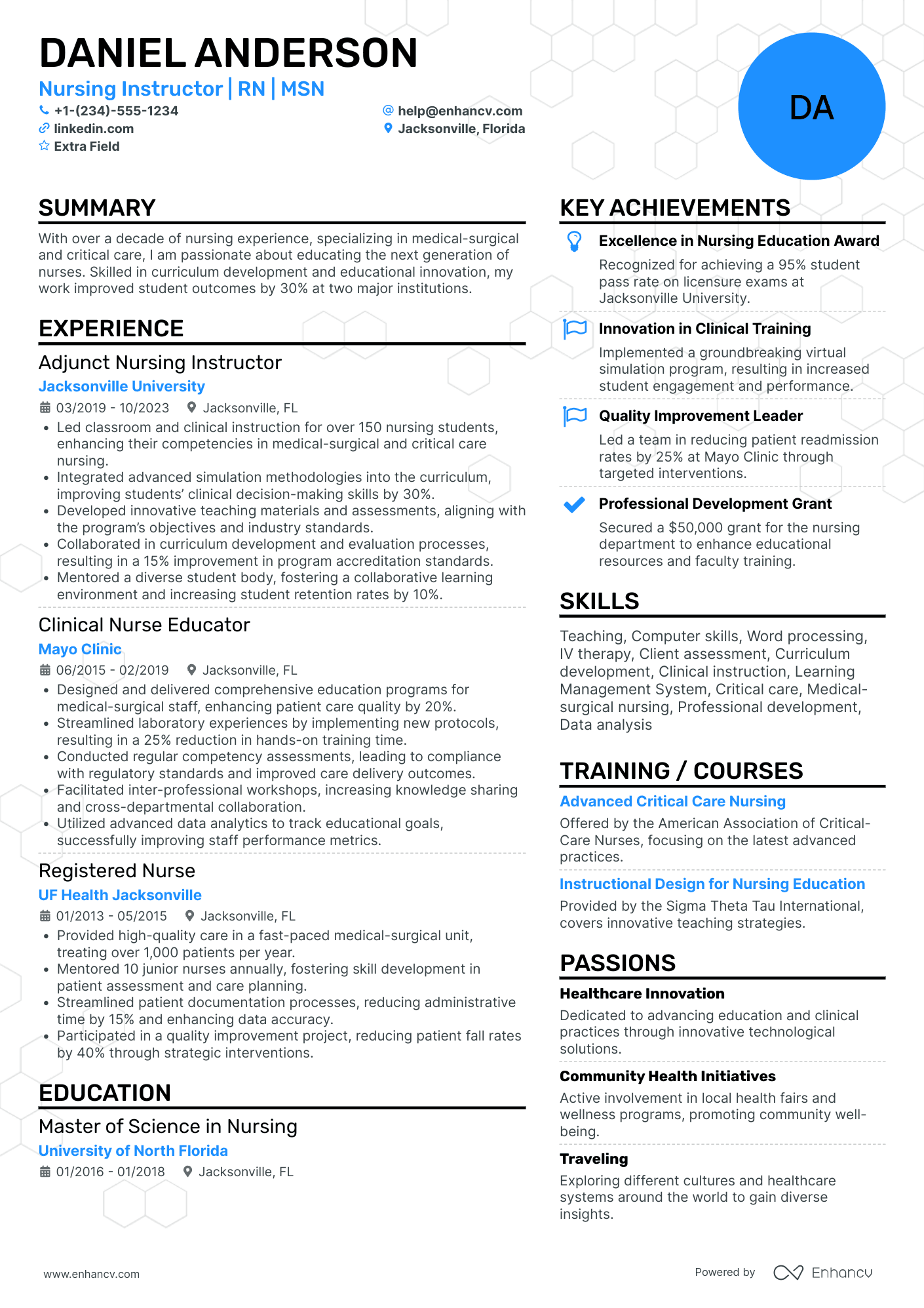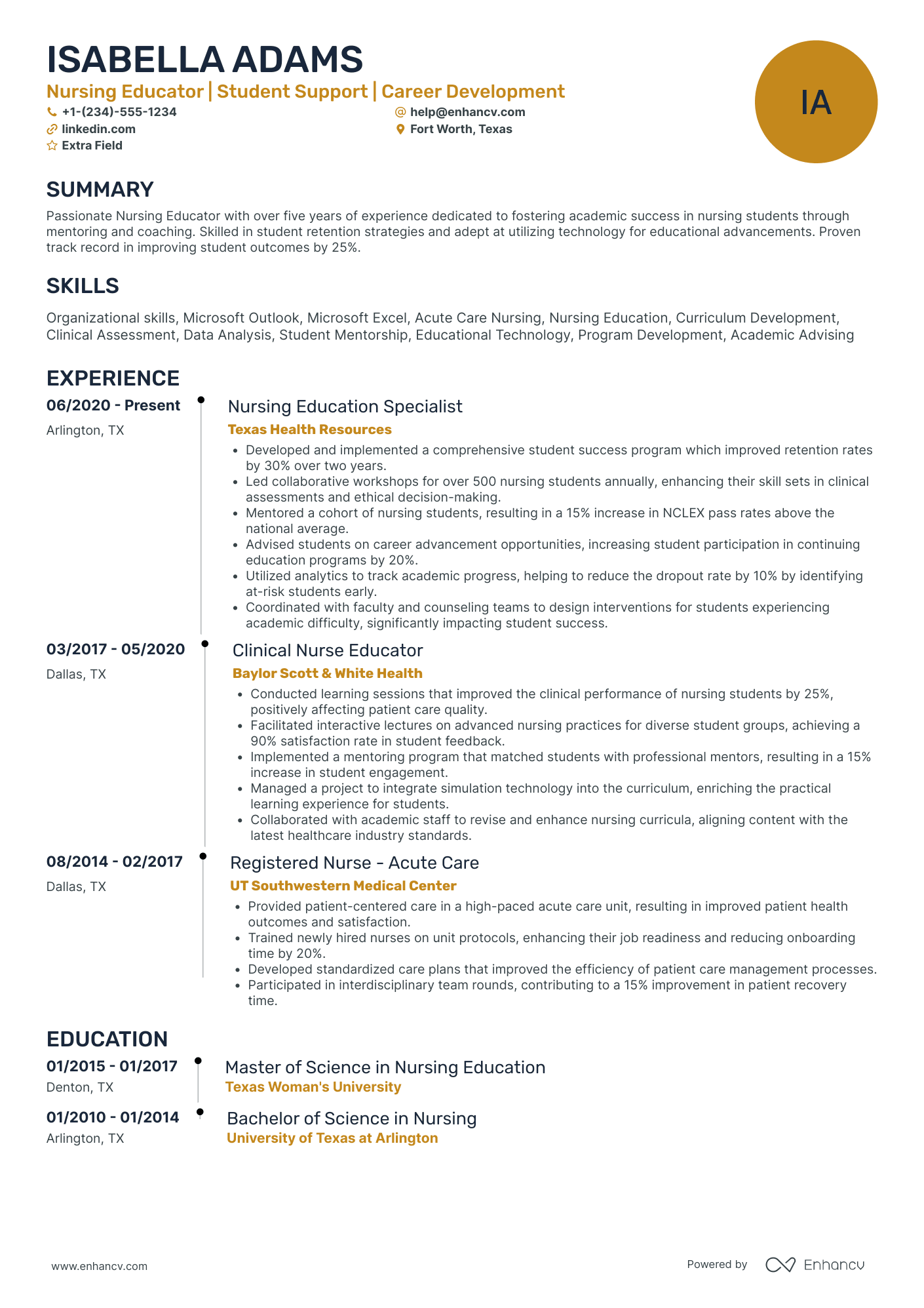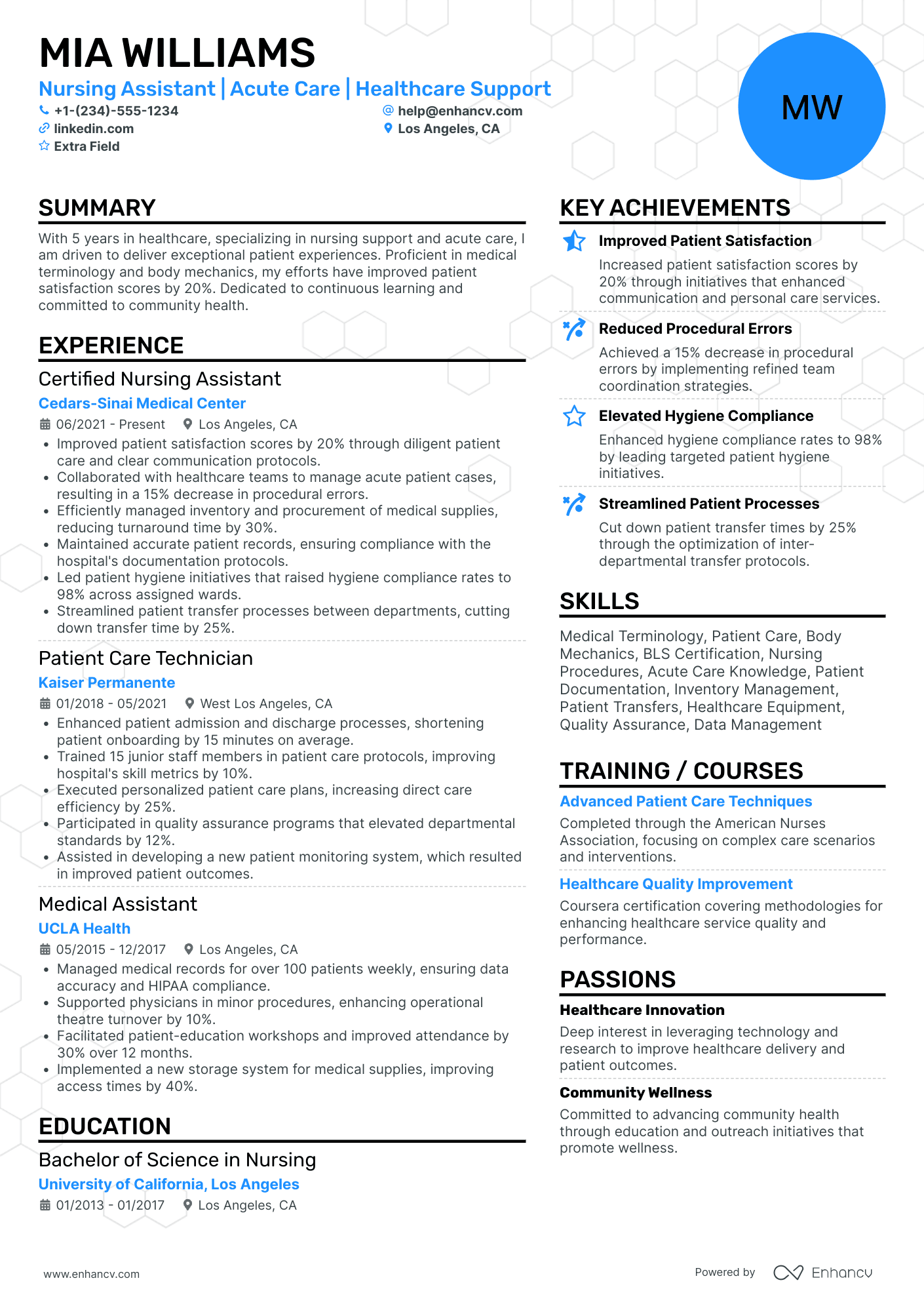You’ve put in the time as a nursing student and know how to operate critical care machines and use other technical tools specific to healthcare.
You’re comfortable in complex, fast-paced environments and have learned in clinical settings.
Now you’re ready to get your first nursing job in the field, but how do you write a nursing student resume with no experience?
We’ve created a guide to help you write a nursing student resume that shows you have the right skills and qualifications for an entry-level nursing position.
In this guide, you’ll learn:
- How to focus on transferable skills so that recruiters can see you’ve developed the knowledge necessary for the job
- How to format your nursing student resume to take the focus off of your experience section and highlight other ways you’ve prepared for the role
- What skills hiring managers look for and how to find the right balance of soft skills and hard skills required for nursing
- How to present your certifications and education clearly so potential employers can see you have the right qualifications for the position
If nursing student resume examples aren’t exactly what you’re looking for, check out some of our guides in a similar field:
Nursing Student resume examples
By Experience
Nursing Student No Experience
Nursing Student For Externship
Nursing Student Clinical Experience
With a distinct link to healthcare, nursing roles are highly influenced by changes in patient care and medical advancements.
Consider the following tips to better apply for jobs involving Nursing Student Clinical Experience:
- Highlight your hands-on skills acquired from clinical rotations. Remember to focus on skills related to patient care, operating medical equipment, medication administration, and documentation.
- Make sure to stress your understanding of safety practices, like infection control measures and safe patient handlingand.
- Showcase your ability to collaborate with a multidisciplinary team, including doctors, nurses, and other healthcare professionals.
- Rather than listing these experiences, establish how these enhanced the overall patient experience or improved the unit's workflow, adhering to the 'skill-action-result' pattern.
Nurse Practitioner Student
Being a Nurse Practitioner Student involves becoming adept at the diverse patient care scenarios and medical technology.
To make your application for Nurse Practitioner roles stand out, consider these tips:
- Your advanced clinical experience should be front and center, especially in specialized areas like family health, pediatrics, or geriatrics.
- Show off your knowledge about patient assessments, diagnosis, treatment plans, and prescription medications.
- Display your experiences working with or under direct supervision of seasoned Nurse Practitioners or doctors, showcasing your ability to learn and adapt.
- Don't just enumerate these skills. Illustrate how they improved patient outcomes, quality of care, or healthcare delivery, using the 'skill-action-result' strategy.
Graduate Nursing Student
Nursing Student Preceptorship
Nursing Student Clinical Rotation
Nursing Student Part-Time Position
Nursing Student Full-Time Position
Nursing Student Summer Internship
By Role
Geriatric Nursing Student
Nursing Student Extern
Pediatric Nursing Student
Nursing Student Intern
Nursing Student Research Assistant
Nursing Student Tutor
Critical Care Nursing Student
Nursing Student Volunteer
Nursing Student Mentor
Nursing Student Resident
How to format a nursing student resume
As a nursing student you need to show hiring managers that you’re ready to work in the field despite your lack of work experience.
Have you gained hands-on clinical experience? Are you up to date on healthcare tech? Do you have the compassion and interpersonal skills to work with patients?
Focus on transferable skills throughout your nursing student resume so potential employers get a good impression of you at first glance.
Here are a few areas to focus your attention when formatting your nursing student resume:
- Functional resume: A functional resume highlights transferable skills instead of your work experience. It’s important to show how you have developed industry skills during your time as a student.
- Header: The top of your resume should include a brief but important header that provides professional contact information and a link to your online profile. Make it easy for hiring managers to contact you for any follow-up questions.
- Key achievements: Industry achievements demonstrate your strengths and show potential employers the kind of success you will bring to their company. Focus on tangible accomplishments from your time as a student or other roles.
- Keep to one page: Use space wisely on your nursing student resume so your information is limited to one page and has no unused white space. Include only the strongest and most relevant information and tailor every section to fit your target job.
Consider the local standards – Canadian resumes, for example, may have a different format.
Is your resume good enough?
Drop your resume here or choose a file. PDF & DOCX only. Max 2MB file size.
The top sections on a nursing student resume:
- Contact information: To ensure recruiters have necessary details to reach out for further process.
- Objective statement: To express career goals and indicate why you’re a good fit for the nursing job.
- Skills & certifications: To highlight relevant technical skills and medical licenses that qualify you for the nursing role.
- Education & training: To demonstrate your nursing education, internship experience, and specialized training.
- Work experience: To showcase your industry experience, hands-on skills, and contributions in previous nursing roles.
What recruiters want to see on your resume:
- Clinical skills: Recruiters prioritize these as they demonstrate the candidate’s practical, hands-on experience in performing nursing tasks.
- Certifications: These are given priority because certain nursing jobs require specific certifications like CPR, BLS, or ACLS.
- Communication skills: These are crucial in nursing for effective interaction with patients, doctors and other healthcare professionals.
- Attention to detail: As the nature of the job often involves administering medication and maintaining records, any mistakes could have serious consequences.
- Adaptability: Nurses often have to handle unexpected situations, so recruiters look for candidates who can adapt quickly.
How to write your nursing student resume experience even if you have none
Your resume experience section is where you show your work history along with accomplishments from each job.
As a nursing student, your focus will be on transferable skills from school or outside experience. Keep your experience section short and highlight any relevant successes or use of industry skills.
If you’ve had jobs outside the field, demonstrate how they’ve prepared you for a career in healthcare. For example, a customer service position can highlight communication and active listening skills.
Let’s look at an example of highlighting transferable skills in a nursing student's resume experience section.
- •Provided direct childcare to children ages 3-12 with patience and adaptability
- •Used eCare software to manage confidential client records
- •Certified in CPR and First Aid
What works in this example:
- Use of soft skills: "Provided direct childcare to children ages 3-12 with patience and adaptability" shows how this candidate has experience with a particular age group and has exercised interpersonal skills that are important for nursing.
- Industry tools: "Used eCare software to manage confidential client records" shows that this candidate has experience with record-keeping software relevant to the healthcare industry.
- Relevant certifications: "Certified in CPR and First Aid" highlights a key skill and training in the field.
Alternatively, you may choose a different section of your resume to focus on if you have no previous work experience.
Let’s look at an example of a project section on a nursing student's resume.
- •Trained 75 students in basic first aid
- •Received 100% on satisfaction survey from teachers
What works in this example:
- Highlights experience: Including a project where you used relevant nursing skills outside of work history shows hiring managers how you have prepared for the role.
- Shows commitment: Showing projects outside of work experience show a dedication to your career path and commitment to growth in the industry.
- Quantifies success: "Received 100% on satisfaction survey from teachers" shows how this candidate achieved measurable success while using relevant industry skills.
How to quantify impact on your nursing student resume
Using real numbers and measurable outcomes on your resume shows potential employers how you will impact success at their organization.
It can be difficult to quantify impact as a nursing student due to the intangible nature of the work or limited hands-on experience.
Here are a few areas to consider when quantifying impact on your nursing student resume:
- Include the number of direct patient care hours during clinical rounds to illustrate the extent of your hands-on experience.
- Specify the volume of patients you handled per shift at past clinical experiences to demonstrate your capability to deal with workload.
- Mention the percentage or rate of patient satisfaction received in your previous nursing roles to show your effectiveness.
- List any quantifiable achievements such as a high-grade point average, a perfect attendance record, or any honors received during your education.
- Quantify the number of team collaborations or interdisciplinary team meetings at past experiences to highlight teamwork skills.
- State the number of medical procedures you assisted with or performed, emphasizing your practical skills.
- Indicate the number of health education sessions you gave to demonstrate your ability to educate patients/caregivers.
- Disclose any reductions in medication errors, falls or increased patient safety metrics you contributed to, showing your value to patient care and safety.
How to list your hard skills and soft skills on your resume
Nurses are skilled medical professionals with dynamic jobs. You have the interpersonal skills to provide compassionate care to patients and clinical knowledge required for healthcare.
Your nursing student resume will present your skills in two major categories.
Hard skills are the technical knowledge and abilities needed to perform job duties, whereas soft skills are the interpersonal and communication skills needed to interact with others.
Hard skills tend to be straightforward and can appear in a simple list form. Here is an example of hard skills on a nursing student’s resume.
Only include hard skills that you’re proficient in and are relevant to your target job. Show potential employers that you have the right combination of skills to fill the role.
Here are a few more hard skills to consider for your nursing student’s resume.
Best hard skills for your nursing student resume
- Clinical Assessment
- Patient Care
- CPR Certification
- Medical Software Proficiency
- Medication Administration
- Basic Life Support (BLS)
- Advanced Cardiac Life Support (ACLS)
- Nursing Informatics
- Electronic Health Record (EHR) Systems
- Disease Management
- Anatomical Knowledge
- Emergency Room Care
- Intensive Care Unit (ICU) Experience
- Surgical Assistance
- Pediatric Nursing Skills
- Labor and Delivery Skills
- Oncology Care
- Proficiency in Siege/ Syringe Pumps
- Patient Education
- Medical Terminology
Soft skills can be open to interpretation and are most effective when provided with an example. Be specific in your soft skills and avoid overused buzzwords on your resume.
Here is an example of a soft skills section on a nursing student’s resume.
Here are a few more soft skills to consider for your nursing student’s resume.
Best soft skills for your nursing student resume
- Empathy
- Communication
- Active Listening
- Adaptability
- Patience
- Decision-Making
- Time Management
- Multitasking
- Problem-Solving
- Stress Management
- Detail Orientation
- Compassion
- Teamwork
- Critical Thinking
- Leadership
- Attention to Detail
- Cultural Sensitivity
- Professionalism
- Initiative
- Interpersonal Skills
How to list your certifications and education on your resume
Minimum education requirements for entry-level nurses typically include an associate's degree in nursing (ADN) or a bachelor of science in nursing (BSN). Qualifications also include being a registered nurse (RN).
Additional licensure and clinical experience requirements may vary by location and organization. Be sure to research the necessary qualifications for your target job.
Your education section should include:
- Name of institution
- Name of degree
- Years attended
Let’s look at an example of a nursing student’s resume education section.
Your nursing student certification section will include any certifications in nursing and specializations.
Here is an example of a certification section on a nursing student’s resume.
Show a commitment to your career by continuing to gain certifications in the industry as trends and demand evolve. Increase your employability by keeping your nursing student resume up to date.
Here are a few more certifications to consider for your nursing student’s resume.
Best certifications for your nursing student resume
How to write your nursing student resume objective
A summary or objective is a great way to introduce yourself to hiring managers and highlight your top industry accomplishment in 3-4 sentences.
Though the terms are often used interchangeably, there is a slight difference between a summary and an objective.
A summary is a brief introduction that communicates your position and value in your industry. An objective looks to the future and captures what you are hoping to achieve in your new position.
As a nursing student with no experience, it is optimal to choose an objective that looks to the future and highlights a goal you share with your target employer.
Let’s look at an example of a nursing student resume objective that doesn’t quite hit the mark.
What doesn’t work with this example:
- No quantifiable achievements: Even with no direct work experience, it is important to highlight how you have achieved success. Show potential employers what you’re capable of.
- Not tailored for target job: This candidate doesn’t provide any specifics on their training or areas of interest. Show hiring managers why you’re the right candidate for their specific organization.
- Unclear goal: Having the goal of working at your target company is not enough. Show potential employers that you’ve done your research and will provide solutions to their problems.
Let’s make a few updates and try this nursing student resume objective again.
What works in this example:
- Shows specific niche: "Aspiring nurse with 2 years of experience volunteering in pediatric hospital” shows that this candidate is familiar with a particular area of nursing.
- Highlights qualification: “Certified in Pediatric Nursing” shows hiring managers that this candidate has the right qualifications for the job and is committed to their career path.
- Clear goal: “Seeking a new position as Pediatric Oncology Nurse to apply my training and expand my skill set at Family Care Hospital" demonstrates how this candidate can use their relevant skills to support the organization and grow within the role.
Optimize your resume summary and objective for ATS
Drop your resume here or choose a file.
PDF & DOCX only. Max 2MB file size.
Key takeaways for writing a great nursing student resume
Congratulations! You’re almost ready to send off that amazing nursing student resume that gets callbacks! Before you start applying to entry-level nursing jobs, let’s review a few key points.
- Format your nursing student resume with a functional layout that highlights transferable skills that have prepared you for the role instead of work history.
- Include additional sections on your nursing student resume like projects that highlight relevant achievements and commitment to the field.
- Show a wide range of hard skills and soft skills necessary for nursing so hiring managers know you can interact with patients as well as use medical tools.
- Clearly present education and certification requirements so recruiters can find the information they need from your nursing student resume quickly and efficiently.
